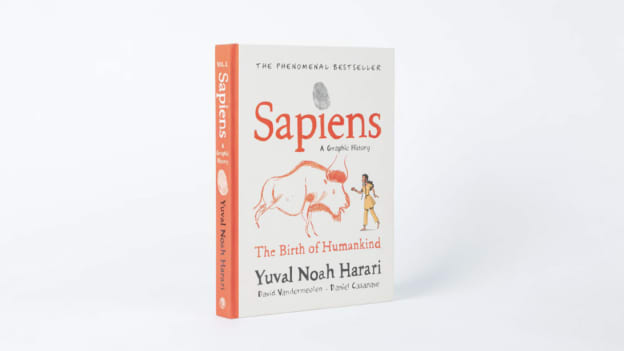Book Review - Sapiens: A Graphic History: The Birth of Humankind Vol. 1

David Vandermeulen & Daniel Casanave teamed up with Yuval Noah Harari, author of Sapiens: A Brief History of Humankind, to create the graphic novel version Sapiens: A Graphic History: The Birth of Humankind Vol. 1. In Volume 1, Vandermeulen & Casanave have illustrated the first part of the original Sapiens book – The Cognitive Revolution (there are a total 4 parts in the original one). The original book had become widely popular among non-fiction readers & it was highly endorsed by many, including Bill Gates, Barack Obama & Mark Zuckerberg.
I haven’t read the original Sapiens book, mainly because I have always found History overwhelming as a subject. To top it, 443 pages of text meant mustering a lot of motivation to read & process the heavy facts & theories. So, for people like me, the graphic novel version is quite a rescue – it gave me a more reachable goal, thanks to illustrations like those in a comic book & a bonus of a great storyline with wit & humour adding to the whole experience. With this book, a complex subject like human evolution became more approachable, understandable & less intimidating, almost entertaining. Win-win situation! The best thing about this book is that one does not need to be an expert to understand & reflect.
As I proceeded with reading this book, I realized as an HR, that human evolution can truly help us understand our behavioural propensities, why we behave the way we behave & its relevance from the perspective of Organizational Behaviour. So, here I am sharing some aspects of human evolution as shared in the book & my take on how they are relevant to HR:
“Our first tools were used to scavenge what was left by majestic lions and ferocious hyenas. And that really helps us understand our history and our psychology. It explains why we're so stressed and always panicking about our position.”
Could this mean that workplace stress has contributing factors from our evolution, which play out subconsciously? Our position in the workplace impacts our salary & many other things related to how we earn our living. So, it’s not office politics or difficult colleagues but our propensity to constantly worry about our standing in the organization which could cause stress.
“Producing a nuclear warhead requires the cooperation of millions of strangers all over the world – from people mining the Uranium ore deep underground to theoretical physicists writing long mathematical formulas about the interactions of subatomic particles. All of Homo Sapiens’ great achievements – from building the pyramids to landing on the Moon are based on large-scale cooperation.”
What differentiates humans from animals is our ability to cooperate, especially in large numbers. According to the author, if thousands of chimpanzees were bunched together in a stadium or a parliament, there would be complete pandemonium. Yet humans, the author notes, can set up orderly systems of cooperation such as trade networks, mass celebrations & political institutions. A lot of times, we abhor the complexity of processes at an organization, but we must not forget that these finally aid large-scale cooperation across thousands to lakhs of stakeholders. At the same time, organizations must strive to keep the complexities in check; the complexity itself must not hinder the goal of processes, which is to get something done in the first place.
“A green monkey can warn, “Careful! A lion!” but a Sapiens can do much more than that…”
The author states that a typical group of Sapiens will get together, share information about a problem, think together & make a plan. The book further explains that language & communication play a crucial role in cooperation within a group as well as in large numbers. I think when we as HRs raise a training requirement of Communication Skills, our objective should not be polishing a certain language but rather focus on Communication Skills as a means to improve teamwork (amongst the members as well as cross-functionally). Collective Intelligence comes into play when a group shares a problem & discusses it with an open mind.
“Over the years, people have woven an incredibly complex network of stories.”
The book states that gods, nations, even legal systems are complex collectively imagined realities so that people can cooperate for the sake of common goals. Stories are the very basis of branding a company, its mission, initiatives, campaigns, etc.; good stories could get more people to agree & cooperate better. Thus, branding is very crucial & can be extremely powerful.
The book further explains that since large scale cooperation is based on stories, the way people can cooperate can be quickly altered by changing the narrative. It seems Homo Sapiens can adapt better to changing situations by simply changing the narrative; I believe this applies to an individual as well as organizations.
These were some really important takeaways & that too only from the first half of the book! I sincerely think Sapiens: A Graphic History: The Birth of Humankind Vol. 1 deserves a reading from every Sapiens. It can be shocking yet enlightening to see how we evolved into what we are today.
My final lesson from the book was that we have clearly evolved from monkeys who could function in a group of not more than 50 (still too ambitious); yet here we are… running systems, organizations & countries. It seems that being able to communicate well & work cordially with people is the true mark of how evolved we are. We may agree to disagree regarding a lot of aspects of this book but a conscious effort to understand is a must.

















